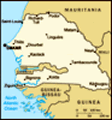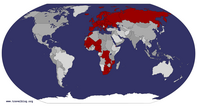Advertisement
Hitching a ride out of Nuakchott took all of two minutes, and the very helpful Mauritanian soldier who offered a ride ended up walking me straight through his country’s notoriously tricky customs in no time at all. Arriving in the bustling Senegalese border town of Rosso would have been intimidating if it hadn’t been for my Nuakchott friend Merina, whose older brother’s daughter (but not his niece) was waiting to guide me to their lovely home near the town center. A note on family relations: it is easy for a Westerner to get confused! A man not only calls his biological dad “father”, but also all the brothers and half brothers of his dad can also be father (meaning all his uncle’s kids are brothers and sisters, instead of regular cousins), and even the friends of his dad are called “uncle”, and the female friends of his mom are called “aunt”. Plus, because of the dominance of Islam a man can have up to four wives, but all the man’s kids refer to each other as brother and sister (in local languages there are rarely words meaning “half-sibling”). Anyway it is all a little difficult to follow if you are used
to drawing out a simple mental family tree; it is more efficient to stick with the conclusion that the exact family ties are not nearly important as knowing that everyone is family, and therefore everyone looks out for each other – family comes first. Just like in Morocco and Mauritania, the door is always open, both literally and figuratively - here it's called Teraanga.
Spent six days with Mama Falla and her family in Rosso - walking in the nearby villages, learning to cook ceep-o-jenn (rice and fish), getting in a little Senegalese Bré (wrestling), and even a few afternoons of high school English and French classes. The French class was rather useful personally, and the English class was a decent reminder that speaking the language does not necessarily translate to the ability to teach it. Being in a packed Senegalese high school was also an interesting experience in itself, the dynamic was not much different than that of high school back home – with kids loving gossip and always looking for a laugh (having a white person coming to high school and actively participating in the class was a good source of entertainment) - but there was clearly

 Hi Mom !!
Hi Mom !!
Thinking about you :)a significantly higher level of respect for the teacher during class time, and also a higher level of classroom participation from nearly every student present.
Merina came down from Nuakchott to spend a few days guiding me from village to village to visit his family and friends. At my insistence we went on foot, passing villages such as Jangi and M’Bildor before slipping back into Mauritania in a pirogue across the Senegalese river, where we spent two nights in the widely-known but tiny village of Kermour. It is an isolated fishing village that is almost completely self-reliant thanks to a large garden watered by an aging pump from the nearby river. The villagers were all very aware of the importance of the pump, and many gravely explained its recent mechanical problems and their hope for the aid to replace it; it would be a great charitable project for a school or organization back home who is looking to do something good (send me a line if interested).
The highlight of Kermour was by far the Saturday night Sabar party. Previously I had never heard of nor seen anything quite like Sabar, and am not sure if I will

 Mauritanian Soiree
Mauritanian Soiree
With Cherife, Roukaya and some French expatsever find any dance quite like it, but it was incredible. Here is a clip that is quite similar to the Kermour experience:
&feature=related No, I did not provide the crowd with the comic relief of running into the circle and trying to dance like that (it was tempting though).
After that incredible night in Kermour, Merina and I said goodbye to his family and crossed back into Senegal before parting ways – he had to get back to work in Nuakchott, and I was St. Louis-bound. Saharan hitchhiking had gone smoothly, but admittedly I had worries about the sub-Saharan version – too many “warning” stories. Happily the two truckers who picked me up for my first “autostope” experience, Alassane and Moussa, were wonderfully friendly despite my far-from-expert francais. They continued the teraanga-trend, offering snacks on the road, inviting me to stay with them in Dakar and even insisting I write down contact info for their families all around Senegal.
Alassane and Moussa dropped me right in St. Louis, where I couchsurfed for four days in the tranquil colonial town - it was almost like being back in France if it wasn’t for the busy African markets. Spent

 Chinguitty
Chinguitty
beautiful dune-filled desert townthe days and nights there relaxing Bob Marley-style and learning from my CS friends Daouda and Lamp Fall about many topics, from their passion for Serigne Touba and the philosophy of the Mouride branch of Islam - it is not all colourful patched clothing and dreadlocks – to yet more stories about Europeans (men and women) coming to Africa, getting married and having a wonderful romantic fantasy life, and then getting tired of it and disappearing back to their home country, leaving their spouse sometimes without even an explanation. The also showed me their project helping the Talibe children in the streets – the Talibe are young village boys sent to the cities to learn the Qu'ran and beg for money and food, earning their 'keep' for their Marabou (religious teacher). They are often abused if they do not collect enough money, thus locals, many of whom have gone through the same treatment, fulfil their “charitable donation” obligation that is the fourth Pillar of Islam, and donate small change to the boys. However it is never enough and many of the Talibe children come to rely on organizations such as those run by Daouda and Lamp.
After the informative

 Saharan dunes
Saharan dunes
the traveller looktime in St. Louis it was on to Dakar, which despite all the hype about the danger and annoyances turned out to be a pretty decent city – especially if you like big, busy, and a cosmopolitan blend of African and European. Spent my first day searching for rather useless embassies (asking for information generally resulted in "go find it on the internet"), and the second swimming between the busy mainland beach and the busy island of Ngor – it was a nice 40 minute comfortable crossing. Dakar was also my first experience Couchsurfing with Peace Corps volunteers, and I came out with a lot of respect for the underlying ideas of the organization, and also its methods of integrating volunteers deep into local society. Also in Dakar was the obligatory visit to the Isle de Goree. I say 'obligatory' because I think anyone with the opportunity to pay respect to what happened during the slave trade must do so; getting an up close and personal glimpse into what those people went through and the atrocious conditions they were kept in gives one an acute sense of freedom upon stopping to reflect on all we have today. This feeling is

 Chinguitty family
Chinguitty family
Roukaya and familyparticularly overpowering when the tour ends and you can board a boat at will to return to mainland Africa – as you sail away from the island, wind in hair, it is impossible for empathy to not pull a few of your heartstrings as you think of the thousands of people who left the island as slaves. The world today is far from perfect, but experiences like these are quality reminders of what we have to appreciate in life. http://en.wikipedia.org/wiki/Gor%C3%A9e
After Dakar the plan was to get to Foundigne, which took about 5 hours of walking through unpopulated open land before finally getting a ride the rest of the way. The town is empty of tourists now but during the season fills up thanks to the sprawling riverside beaches and off the beaten track appeal. Chilled out for a night of celebrating Bob Marley Day while dancing around a 15 ft bonfire, then another day of 4 hours of walking before getting back on the main road and hitching the rest of the way to Kaolack, and onwards to Tambacounda.
When Senegalese from the North warned me it would be hot here in Tamba, I said after crossing

 Saharan dunes2
Saharan dunes2
the Mauritanian lookthe Sahara it wouldn’t be a problem – well I was wrong. I am pretty sure its around 46C outside right now, and its not even possible to have a shower to cool down because you could probably make a cup of coffee with the water coming from the tap. Let's just say being here two days has solidified the decision NOT to head to Mali until after summer, so tomorrow its on to Niokolo Koba National Park, with all its reported lions and baboons, and then hiking southbound towards the mountainous of Guinea border. No visa yet, but let’s leave this one to chance and the powers of Teraanga - we'll see what adventure results.
Advertisement
Tot: 0.14s; Tpl: 0.022s; cc: 12; qc: 32; dbt: 0.0563s; 1; m:domysql w:travelblog (10.17.0.13); sld: 1;
; mem: 1.1mb

























Dad
non-member comment
The amazing adventure continues
You look great, and there's a real glow on your face no doubt from all the amazing experiences you've already had! You are meeting and endless stream of people who really do have the best life can offer, friendship, happiness and the love of family. With that 46 degree weather and endless sunshine I expect you're staying in the shade most days, hard to imagine that level of heat when you come from Canada! Keep on truckin' Love dad